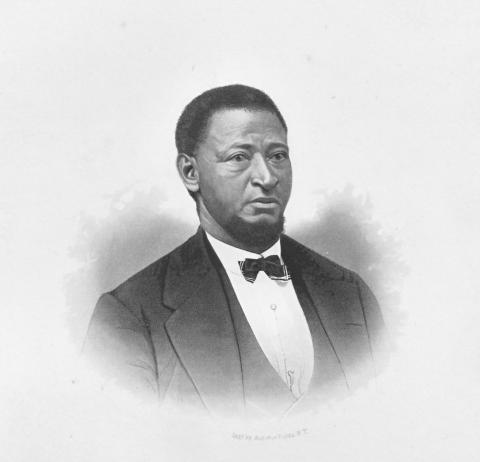This etching, titled "Alexander Clark - Grand Master," was created by Augustus Robin around 1895. The etching is of Alexander Clark, who is regarded as one of Muscatine's most prominent citizens. Clark was born free in Pennsylvania in 1826 and moved to Muscatine from Cincinnati at the age of 16 to work as a barber. Once settled, he opened a business selling firewood to Mississippi River steamboats and thereby amassed considerable wealth. He also became an entrepreneur in local real estate. In 1850, he helped to organize the African Methodist Episcopal church in Muscatine and served as an officer there for 25 years. In 1865, he helped organize the Grand Lodge of Missouri, Prince Hall Masons, and served as Grand Master. Later, in 1884, he organized the Hiram Grand Lodge in Iowa and also served as Grand Master. In 1868, Clark was appointed chairman of a "colored mans" committee to rewrite the Iowa State constitution, eliminating the word "white" from the document, and thereby granting political equality to Iowans two years before the ratification of the Fifteenth Amendment to the United States Constitution. Clark is notable in Iowa history for other things, too. He sued the Muscatine school board on behalf of his daughter, Susan, in a landmark case that outlawed school segregation in Iowa. His son, Alexander Jr., became the first black graduate of the University of Iowa law school in 1879. Alexander Sr. became the second black graduate of the law school in 1884 at the age of 58. Clark was also active in Republican politics and was called "the Colored Orator of the West" for his speeches on the right of suffrage. In 1890, President Benjamin Harrison offered Clark the opportunity to become the first United States ambassador to the nation of Liberia at an annual salary of $4,000. Clark died of fever in Liberia in 1891. Content can be used with the following standards: 3rd grade SS 3.28 Cultural Contributions, 5th grade SS 5.26 Civil Rights, 8th grade SS 8.25 Iowa Governments, SS-Gov.9-12.28 Iowa Issues and Policy and SS-U.S. 9-12.23 Iowans Influence U.S. History. Lessons can be formed on Clarks' contribution to fighting for civil rights change in Iowa and the legislation changes regarding African-Americans during the late 1800s after the Civil War. For any use other than instructional resources, please check with the organization that owns this item regarding copyright restrictions.
2018.010.014 [Etching]
Legal Status
Ownership of this resource is held by the Muscatine Art Center and has been provided here for educational purposes only, specifically for use in the Iowa Museum Association's "Teaching Iowa History" project. It may not be downloaded, reproduced or distributed in any format without written permission from the Rights Holder. For information on U.S. and International copyright laws, consult an attorney.

